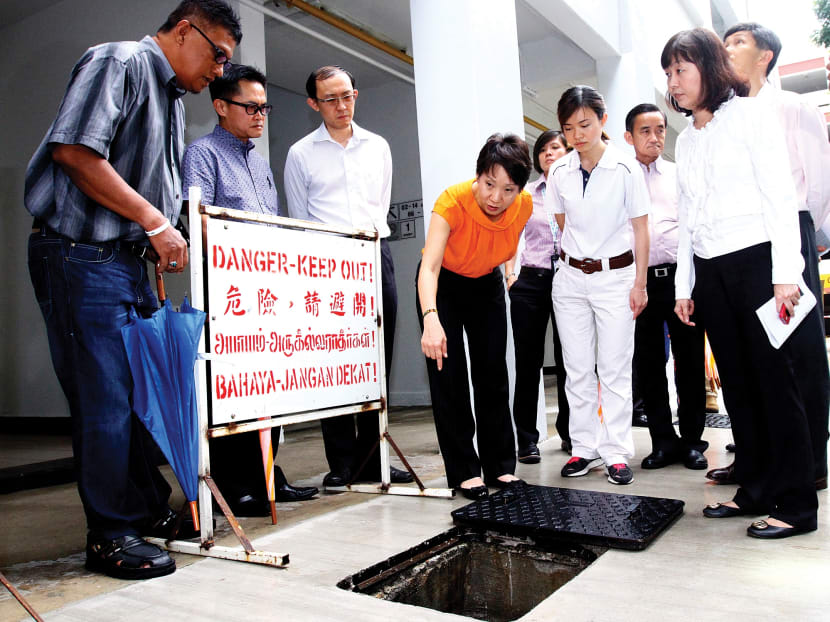Circuit Road dengue cluster dominated by DEN-2 cases
SINGAPORE — While the rest of the island is seeing dengue cases caused mainly by the DEN-1 virus strain, MacPherson’s Circuit Road, currently the largest active cluster, is seeing more DEN-2 cases.

Second Minister for the Environment and Water Resources Grace Fu
(in orange) being shown a drainage system where there is likely to be a mosquito breeding ground, during a site visit to MacPherson estate yesterday. PHOTO: ERNEST CHUA
SINGAPORE — While the rest of the island is seeing dengue cases caused mainly by the DEN-1 virus strain, MacPherson’s Circuit Road, currently the largest active cluster, is seeing more DEN-2 cases.
However, it is still too early to call the development a serotype switch, said Second Minister for the Environment and Water Resources Grace Fu yesterday.
As of Wednesday, 231 dengue cases have been reported in the Circuit Road cluster, of which 80 per cent are DEN-2, and the rest DEN-1.
In contrast, DEN-1 comprised 82.4 per cent of dengue cases across the island in the first eight months of this year, while DEN-2 made up 15.4 per cent. Only a very small number of DEN-3 and DEN-4 cases — the other two of the four types of dengue virus strains — were reported during the same period.
Ms Fu, who visited the Circuit Road dengue cluster, said: “It is too early to predict that this is a switch of serotype, but we will monitor the situation closely.”
A person who has been previously infected by one of the four dengue virus strains would develop lifelong immunity to that particular serotype, but not the other three. A change in the predominant strain is a cause for concern because the population lacks immunity to the new circulating serotype.
In March, Minister for the Environment and Water Resources Vivian Balakrishnan told Parliament that last year’s dengue outbreak was due to a serotype switch from DEN-2 to DEN-1.
Circuit Road has been identified as a dengue hot spot since June 10. During yesterday’s site visit, Ms Png Chiew Hoon, general manager of Marine Parade Town Council, said it has been working with contractors to tackle the dengue problem, such as increasing checks on drains and common corridors, and conducting regular fogging exercises.
The National Environment Agency (NEA) is also working with grassroots leaders to reach out to residents in the respective dengue clusters, by distributing insect repellants and advising them on dengue-preventive measures.
Ms Fu called on residents to work closely with the town council and the authorities, saying that they should not let their guard down, even if they have had dengue before.
Meanwhile, the total number of dengue cases reported dipped to 421 last week — from 442 the previous week. Since the start of this year, 13,837 dengue cases have been reported, the NEA’s dengue website showed. More than 22,000 cases were reported last year.
The NEA said it has conducted two million inspections to date and will continue to focus on areas with high potential for dengue transmission, such as construction sites.






